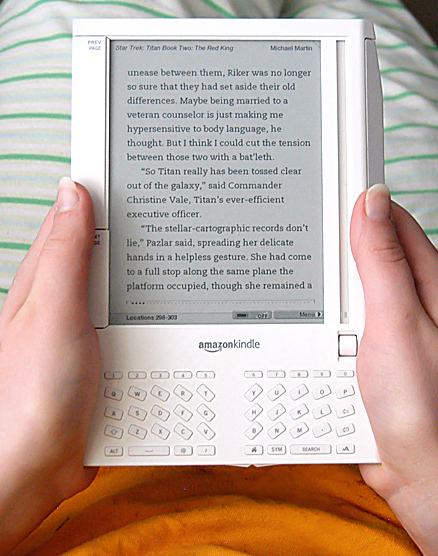Coverage of the Hachette-vs-Amazon dispute has recycled
various misconceptions about what’s happening, as Michael Cader noted Wednesday in Publishers Lunch. But one of the most widespread fallacies you may hear, and
not just relating to Hachette/Amazon, is that “e-books have been more
profitable for publishers than print books,” as Evan Hughes put it in Slate.
The chunky margins generated by e-books, the thinking goes, are what the publisher
and the 600-pound gorilla of bookselling are tussling for.
Even before this dispute, some industry voices, led by Mike Shatzkin
(echoed by Hughes in the piece just cited, and of course the agent community),
have argued that in a sense publishers have been asking for trouble by
maintaining such high margins on e-books—like kids walking back from the candy
store, their pockets bulging, past the local bully. Shatzkin proposed that
publishers raise their royalty rates on e-books so that they could gain some
advantage by sharing the “extra” profits with authors before the retailers
could zero in on them.
Mike’s suggestion was prescient, and there are other good
arguments for passing along more e-book revenue to authors (starting with, "they could use the money"). Nonetheless I believe publishers would have been better
served by pointing out, long ago, that the notion of e-books as a magical cash cow
is wildly misleading. Because the
supposedly greater profits from e-books—when published alongside traditional
print editions—are an artifact of accounting. The margins that both Amazon
and Hachette find in e-books are only as high as they are because of all the resources Hachette devotes to hardcovers and paperbacks.
Today in mainstream publishing, e-books are almost
invariably published alongside a hardcover or paperback edition. This means the
e-book edition floats on top of a huge investment in whatever that title is, which in most houses is not charged
against the e-book edition.
Consider the following costs incurred in publishing a new
title:
The advance—frequently the largest single line item in the
investment in a given book, and in many houses charged entirely to the first
print edition. Even when it’s allocated otherwise, there are many other costs
that are charged the print book, such as:
“Plant” costs—such as copyediting and
proofreading, typesetting, design, illustrations, legal vetting, maps. These
are typically charged to the hardcover edition, even though the paperback or
e-book editions benefit equally from them. (Side note: for the same reason, even
in pre-e-days, paperbacks were often seen as more profitable than they "deserved" to be.)
Furthermore, marketing costs are also charged to the
hardcover even when the e-book is published simultaneously. These include
promotion (catalogues, advance reading copies, BookExpo displays, etc);
advertising; and publicity (review copies and ARCs, author tours). Obviously
all these efforts are working to sell the e-book just as much as the print
edition.
And alongside those expenses are the heinous, eye-watering costs of producing and distributing
physical books: Printing, sales
commissions, warehousing, shipping, and all the hideous inefficiencies of
taking returns.
Wait a minute, you’re saying, now you’re going too far. Why
should the new, innocent e-book be charged for costs of the bad old dead-tree
"legacy" (shudder) business?
Because the existence
of printed books, the trafficking and display of them, is still a critical
marketing tool for e-books!
What is the currency of advertising? Impressions. Every
physical book you see as you go through your day is an impression, just a like
a Coke ad on a bus shelter or a Coach logo on a handbag--each of those glimpses
is a little hit of marketing. Think
about the millions of printed books out in the world--displayed in store
windows, piled on tables, racked at the checkout in supermarkets and drugstores.
Or seen in the hands of people on airplanes and buses; given as given as Christmas
or Mother's Day presents to people you know.
We know that one of the reasons people buy books is that
they see other people enjoying them (hence the enduring popularity of bestsellers, even in a long-tail marketplace). There is no
question that many of the titles on the e-book bestseller list are boosted by the
visible popularity of hardcovers and paperbacks. The thankfully still-robust
presence of printed books contributes significantly, I would argue, to the
“mindshare” enjoyed by any e-book--not to mention the overall "mindshare" of "book" as a category of entertainment.
There
are, to be sure, e-only bestsellers—works that achieve significant sales
without riding the coattails of a print edition. I would guess, though, that
very few titles which have achieved true blockbuster e-book sales—tens or
hundreds of thousands of copies—have done so without a blockbuster print
edition helping to spread the word. (Fifty Shades of Gray, a bestseller as an e-book, became a megahit when Random House published a print edition.)
Perhaps I’m pressing a point if I go from there to arguing
that the cost of trucking a new title to a Barnes & Noble distribution
center ought to be spread across its e-book edition. But the larger point is
that it’s arbitrary at best, and again, misleading, to think we can neatly
separate print from e-book costs, when publishing any title is a multi-platform campaign.
And it leads to fuzzy thinking about the business if we look at the P&L
spreadsheet for a given book and say “wow, the e-book is really profitable”
when the poor hardcover is carrying 80 or 90 percent of the investment load. What’s
really happening, if you look at this another way, is that the print edition is
subsidizing the e-book!
My point here is not to bash the e-book business. It is true
that e-books have an enormous economic advantage over print when it comes to manufacturing
and distribution, because the incremental unit cost of creating &
delivering an e-book is virtually nil. (Even better, no warehousing and no
returns.) You need no publishing
expertise to see this, and it’s one reason why it seems intuitive to say e-books
are more profitable.
Some publishers, I’m afraid, have encouraged this misapprehension.
Corporate houses in particular like to trumpet the profitability of their
digital businesses because it makes them look “innovative” and tech-savvy and
gives Wall Street an easily-grasped, upbeat story of a growth driver in the
industry. Trade publishing companies have historically thrown off quite modest, not to say
anemic, profits and have for decades been caricatured as quaint, retrograde,
etc. so maybe we can’t blame them for bragging about better margins
that seem to come from new technology.
But for all the reasons above, it's wrong to consider the
profitability of an e-book edition separately from an accompanying print title.
And it makes no sense for publishers to boast of wonderful margins on e-books,
unless they are also going to apologize for the lousy margins they get on print
titles.
Publishers are straining mightily to maintain a healthy
publishing ecosystem that includes print and e-books, online selling and
brick-and-mortar bookstores. This is not out of nostalgia or an inability to
grasp the digital future, but because they understand, as explained above, that
print and e-book sales boost each other. And if they give away too much of their revenue from e-books, whether to retailers or to authors, they risk making that multi-format marketplace unsustainable.











